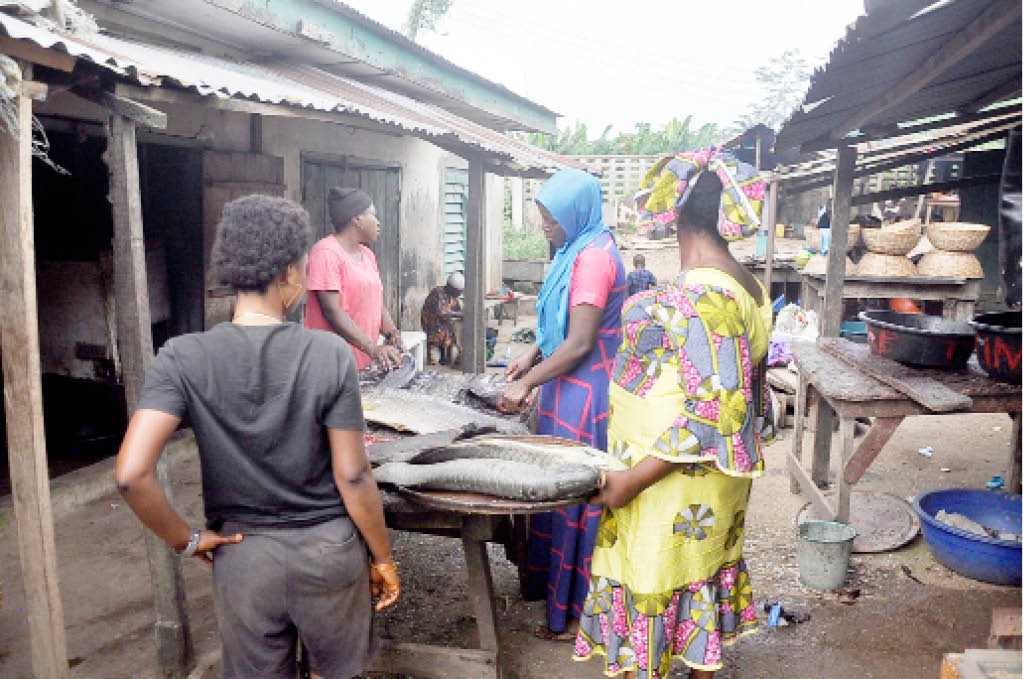Fish sellers recount glorious days as supply, sales drop
By Vincent A. Yusuf, Daramola A. Flourish, Hayatudeen Hafsat & Ummaima Yakubu For many fish traders at the Kado market in Abuja, supply and sales are dwindling. Muhammad Inuwa started the business in 1996, during the Abacha regime when many things were in order, but in recent times, insecurity and worsening economic woes that […]

Customers and fish sellers bargaining at Oluwo Fish Market, Epe in Lagos
By Vincent A. Yusuf, Daramola A. Flourish, Hayatudeen Hafsat & Ummaima Yakubu
For many fish traders at the Kado market in Abuja, supply and sales are dwindling.
Muhammad Inuwa started the business in 1996, during the Abacha regime when many things were in order, but in recent times, insecurity and worsening economic woes that have reduced the purchasing power of many families, are taking a toll on his fish business.
Now supply and sales have gone down significantly, and the increase in prices is scaring buyers away.
Inuwa gets his supplies from Maiduguri, in Borno, Kebbi and Nasarawa states, but nowadays, due to the level of insecurity, the rate at which he gets consignments from these states is a huge challenge.
Presently, travelling to get supply is almost out of the question, so the option is to send money to relatives to purchase the goods and send to him and other sellers.
The business then was better because they could get their supply anytime without worrying about insecurity, especially from Maiduguri.
Through income generated from the business, Inuwa has performed the Hajj, built a house and sent his children to school. He noted that these would have been difficult under the current economic environment. However, he is determined to move on as every business has ups and downs.
For Mallam Hussaini, who sells fresh catfish, the business he started about 20 years ago is also going through a difficult moment.
He started from the town in 2004 before Governor Nasir El-Rufai relocated them to Kado market and other fish sellers also moved in. Before the relocation, most of them started from the new market, Wuse II, Central Mosque, Maitama and some from Kuje.
Hussaini outlined the current challenges to include high cost of fish, mortality of fish, which translates to a big loss for them and the non-availability of space in the market because of the large number of traders who have all converged on the market.
He said he gets supplies from Ibadan, Kano, Ekiti and Shiroro Dam in Niger State and a pocket of other farms in and around Abuja, the Federal Capital Territory (FCT).
“As we are talking now, some goods have been supplied and another set of fish has already been harvested. We have the farmers’ numbers. All we needed to do is to agree on the price and send the money and they would supply it to us,” he said.
Asked how much he makes a day, he said: “Honestly, the gain isn’t much like previous years. Then, after every sale, we make up to N2 million but now things have changed; feeds are expensive, transportation is expensive among others. That is why the profit has reduced with us making less around N100,000.
“Now, for instance, when you carry a 25kg rubber, you may make at least N3,000, then if as a dealer I go with 50 rubbers of 25kg each, with every rubber I make N3,000, that will amount to N150,000 but you have to pay for transportation, fuel and others.
“The freshwater fish, which was N1,800 then, now costs N4,000.” Everything you are seeing here has changed, honestly, from the previous years.
“Since I started the business, I have done a lot of things. I got married, built a house, bought cars, provided for my family and saw them through schools.
“Even here, I have younger ones, and they are all benefiting from it, before they start their own, by the grace of God.
“For the shop rent, I pay N500,000 yearly and without those achievements, I wouldn’t be here – the same goes for every other seller here too. Some of them have their own shops, which they bought, while others pay rent,” he explained.
Hussaini said government was like a mother to them, adding that “everything you are seeing here is all because of the government.”
“Initially, we were all displaced, but now the government has helped by providing a better place. Before the help, we as fish sellers were humiliated. You will go out to sell your fish but you will be humiliated by the task force, chased and taken to court, but now we have our freedom.
“What I want from the government is to help us create more spaces to accommodate more youths who can do this sort of business. Many of them here can do this, but space is a challenge.”
According to him, the cost of feed has pushed the price of fresh fish up, adding that a kilogramme of fresh catfish which went for N500 years back, is now sold for N1200.
Mrs Helen, who has been in the fish feed business with her mum for the past 10 years, is also feeling the heat. She said profit these days has declined considerably compared to what it used to be five years ago.
“For instance, there are days we sell just a bag of feed and sometimes we don’t sell at all. Before now, sometimes we sell 30 bags of feeds a day,” she said.
